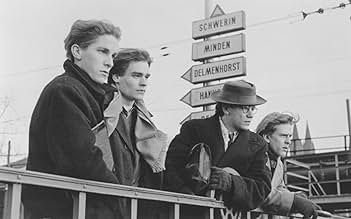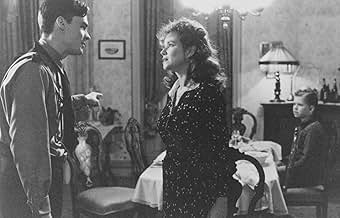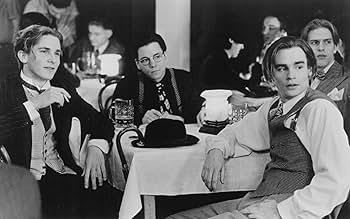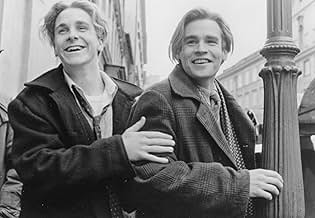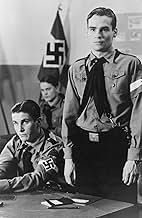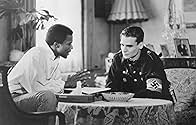AVALIAÇÃO DA IMDb
6,8/10
18 mil
SUA AVALIAÇÃO
Um grupo de adolescentes adora a música proibida na Alemanha nazista, pouco antes da eclosão da Segunda Guerra Mundial.Um grupo de adolescentes adora a música proibida na Alemanha nazista, pouco antes da eclosão da Segunda Guerra Mundial.Um grupo de adolescentes adora a música proibida na Alemanha nazista, pouco antes da eclosão da Segunda Guerra Mundial.
- Direção
- Roteirista
- Artistas
- Prêmios
- 1 vitória e 1 indicação no total
Jessica Hynes
- Helga
- (as Jessica Stevenson)
Avaliações em destaque
Four German teenage boys (Leonard, Bale, Whaley, and Batrok), living under Nazy reign in World War II, secretly play Swing music, American stuff that's been forbidden, and embrace the concepts of the musical heritage. But this is clearly an act of rebellion, so they must do it in secret clubs at night, avoiding the Gestapo. Their relationships and the outcomes are the study of this film, which is both uneven and, ultimately, very powerful.
Roger Ebert detested this film for the fact that, to him, is unclear in it's message. He feels that the motives behind these teen's rebellion are stupid: It seems as if Hitler hadn't banned Swing music, then they would have thought that he was a swell guy.
Actually, this observation on Mr. Ebert's behalf might be the film's point. They thought Hitler was a loser because of he didn't let them play their music. Through this fact, they learn that there is a much bigger problem here, and they know that they can't conform to it. So how do they rebell? Through the music that they cherish.
Along the way, two of the boys, Leonard and Bale, are forced to join the Gestapo. Leonard doesn't embrace the teachings, but Bale is slowly brainwashed into conforming. Whaley is a cripple, and he therefore observes the Nazis from a different position. He soon begins to despise his two friends for their uniforms. While his character might be an arrogant jerk, it is clear that he's got a better idea about the evil that's going on than anyone else. Bartok is just sort of along for the ride, just wanting to hang out with his friends and play in his music...oblivious to what happens with the Jews or Nazis.
So here we have four chief characters that pretty much represent probably the most basic attitudes of German citizens during the war: Brainwashed, aware, torn in between, and indifferent. The characters are well acted, and the balance and chemisty between them work. The message at the end is very clear and VERY powerful....I am often reminded of its subtle excellence, though I haven't seen it in a good while.
Unfortunately, the film itself is uneven. Almost too much time is spent on the swing music itself. So much that it takes away from the message of the film. The music should have only served as a backdrop, and endless scenes of dancing almost threaten to take away from the impact of the theme. "Almost" is the key word. All in all, this is a most intriguing film. Kenneth Branagh appears unbilled, as a central Gestapo character.
*** out of ****
Roger Ebert detested this film for the fact that, to him, is unclear in it's message. He feels that the motives behind these teen's rebellion are stupid: It seems as if Hitler hadn't banned Swing music, then they would have thought that he was a swell guy.
Actually, this observation on Mr. Ebert's behalf might be the film's point. They thought Hitler was a loser because of he didn't let them play their music. Through this fact, they learn that there is a much bigger problem here, and they know that they can't conform to it. So how do they rebell? Through the music that they cherish.
Along the way, two of the boys, Leonard and Bale, are forced to join the Gestapo. Leonard doesn't embrace the teachings, but Bale is slowly brainwashed into conforming. Whaley is a cripple, and he therefore observes the Nazis from a different position. He soon begins to despise his two friends for their uniforms. While his character might be an arrogant jerk, it is clear that he's got a better idea about the evil that's going on than anyone else. Bartok is just sort of along for the ride, just wanting to hang out with his friends and play in his music...oblivious to what happens with the Jews or Nazis.
So here we have four chief characters that pretty much represent probably the most basic attitudes of German citizens during the war: Brainwashed, aware, torn in between, and indifferent. The characters are well acted, and the balance and chemisty between them work. The message at the end is very clear and VERY powerful....I am often reminded of its subtle excellence, though I haven't seen it in a good while.
Unfortunately, the film itself is uneven. Almost too much time is spent on the swing music itself. So much that it takes away from the message of the film. The music should have only served as a backdrop, and endless scenes of dancing almost threaten to take away from the impact of the theme. "Almost" is the key word. All in all, this is a most intriguing film. Kenneth Branagh appears unbilled, as a central Gestapo character.
*** out of ****
I have always been a very big fan of swing music and am a "Hollywood Jew". I.e., not very religious or observant of the ancient traditions, but still a Jew in humor and emotions. So this movie never fails to make my tear up. To imagine a time and place where not only your seeming friends turn on you, but you can't even listen to your kind of music is a special kind of hell on earth.
The dance and music sequences are wonderful and I can't see or hear them enough. Solid sounds, daddio! However, the film wisely preempts the reverie and jerks you back to the Nazi repression each time. It suggests how those poor "Swingkleine" must have felt. The sweet and sorrowful blend here.
Someone criticized this picture for not showing enough death. I think the boxes of human ashes and the random Brownshirt raids show enough of that! This picture isn't about the Holocaust -- it's about trying to survive when your society goes seriously wrong.
I will always think of "Swing Kids" when I hear the truism: "It don' mean a thing if it ain't got that SWING. Do-wah do-wha do-wah do-wah do-wha do-wha do-wha do-WHAAAAA".
The dance and music sequences are wonderful and I can't see or hear them enough. Solid sounds, daddio! However, the film wisely preempts the reverie and jerks you back to the Nazi repression each time. It suggests how those poor "Swingkleine" must have felt. The sweet and sorrowful blend here.
Someone criticized this picture for not showing enough death. I think the boxes of human ashes and the random Brownshirt raids show enough of that! This picture isn't about the Holocaust -- it's about trying to survive when your society goes seriously wrong.
I will always think of "Swing Kids" when I hear the truism: "It don' mean a thing if it ain't got that SWING. Do-wah do-wha do-wah do-wah do-wha do-wha do-wha do-WHAAAAA".
The central characters in this movie are unpolitical teenagers who have no concern with the larger political issues of Naziism and simply want to enjoy themselves. Their only perspective is that Nazis are stuffy, conformist jerks and no fun at all. For this reason, a number of mainstream critics (among them Ebert and Berardinelli) trashed the picture for trivializing the crimes and horrors of the Third Reich. These critics, I think, miss the point.
The value of the movie is precisely that it is trivial. There is no hindsight. The audience, like the characters, is caught up in the everydayness of everyday life in a totalitarian state. The Nazis are the government, and as far as anyone can see in 1938-39 they are going to go on being the government forever. The war hasn't happened yet. The Swastika flag flying over every post office and courthouse doesn't give them a little shudder of horror; it's as normal as the Stars and Stripes is to us. All sensible, respectable people who aren't Nazis themselves go along with the Nazis, because they have no reason not to.
Auschwitz hasn't happened yet either. Sure, there are concentration camps out there somewhere, but that has nothing to do with normal, ordinary people who behave themselves. Unless you happen to know a Jew or a political dissident yourself, what the government is doing to people like that isn't your problem.
The teen-aged lead characters find themselves in opposition and in trouble, not because they have any principled objections to the government, but simply because they find respectable culture boring and want to amuse themselves. The first reaction of authority, in the person of Kenneth Branagh's kindly Gestapo man, is that all they need is a good talking to, a second chance, and a little constructive guidance in the Hitler Youth and they'll grow up to be good citizens. He's fifty percent right; Thomas does respond positively to the comradeship and healthy outdoor activity he finds there.
The ultimate choices made by the two boys are governed not by principle but by their personal situations. Thomas has been rebelling against his cold, pompous, wealthy father, whom he loathes, and he ultimately decides that being a dutiful Nazi and denouncing the old man to the Gestapo offers him much better revenge than dancing to illegal jazz records. Peter recoils from the Hitler Youth (and from his former friend) because his own father had disappeared, perhaps into the camps, after the Nazis took power several years earlier.
There's's no hindsight in the movie's perspective, and no heroism. Instead, it gives us ordinary, everyday people dealing with ordinary everyday life as they find it, from the viewpoint of a high school student. The movie leads the adolescents who are its target audience to ask themselves an unpleasant question -- would they be any different, any more politically aware, if they were in the same situation? Indeed, would they even realize it if they were actually in the same situation now?
The implicit answer is that they probably wouldn't be all that different from ordinary non-political German teenagers in 1938, minding their own business, going about their own lives, and at most trying to carve a little more personal space than the government wants to give them. That's disconcerting and not at all flattering, which is why Swing Kids is worth watching.
The value of the movie is precisely that it is trivial. There is no hindsight. The audience, like the characters, is caught up in the everydayness of everyday life in a totalitarian state. The Nazis are the government, and as far as anyone can see in 1938-39 they are going to go on being the government forever. The war hasn't happened yet. The Swastika flag flying over every post office and courthouse doesn't give them a little shudder of horror; it's as normal as the Stars and Stripes is to us. All sensible, respectable people who aren't Nazis themselves go along with the Nazis, because they have no reason not to.
Auschwitz hasn't happened yet either. Sure, there are concentration camps out there somewhere, but that has nothing to do with normal, ordinary people who behave themselves. Unless you happen to know a Jew or a political dissident yourself, what the government is doing to people like that isn't your problem.
The teen-aged lead characters find themselves in opposition and in trouble, not because they have any principled objections to the government, but simply because they find respectable culture boring and want to amuse themselves. The first reaction of authority, in the person of Kenneth Branagh's kindly Gestapo man, is that all they need is a good talking to, a second chance, and a little constructive guidance in the Hitler Youth and they'll grow up to be good citizens. He's fifty percent right; Thomas does respond positively to the comradeship and healthy outdoor activity he finds there.
The ultimate choices made by the two boys are governed not by principle but by their personal situations. Thomas has been rebelling against his cold, pompous, wealthy father, whom he loathes, and he ultimately decides that being a dutiful Nazi and denouncing the old man to the Gestapo offers him much better revenge than dancing to illegal jazz records. Peter recoils from the Hitler Youth (and from his former friend) because his own father had disappeared, perhaps into the camps, after the Nazis took power several years earlier.
There's's no hindsight in the movie's perspective, and no heroism. Instead, it gives us ordinary, everyday people dealing with ordinary everyday life as they find it, from the viewpoint of a high school student. The movie leads the adolescents who are its target audience to ask themselves an unpleasant question -- would they be any different, any more politically aware, if they were in the same situation? Indeed, would they even realize it if they were actually in the same situation now?
The implicit answer is that they probably wouldn't be all that different from ordinary non-political German teenagers in 1938, minding their own business, going about their own lives, and at most trying to carve a little more personal space than the government wants to give them. That's disconcerting and not at all flattering, which is why Swing Kids is worth watching.
This movie does a great job of showing a different angle on the WW2 time period. The struggles the youth of Germany went through during that time were portrayed very well. People complain that this movie doesn't show the horror of the holocaust and the awful persecution the Jews faced, but that is not what it's trying to do! We all read or hear about what the Nazis did to the Jews (& other minorities) and think that the Germans must have been horrible people to have even gone along with this. But this shows how the propaganda they were constantly fed--as well as the activities & sense of belonging the HJ (Hitler Jungen) experienced--could slowly twist their minds to the Nazi way of thinking. One of the excellent things about this movie is how it shows how the main characters change. The changes in Peter & Thomas come very slow and natural, and only when you get to the end (and maybe re-watch it) do you realize how drastically they have changed their views. (Thomas especially)
There were some not-so-great things about the movie, like some characters or scenes which, when you think back, seem to have been included for an unknown reason. But the good points of the movie out-weigh the minor nit-picks. The swing music and dancing in the movie was awesome, and I thought all the characters were acted very well by the actors. They did a good job of showing the confusion that the young Germans must have felt, not knowing who was right. All in all, I really enjoyed this movie, and I think it makes you think as well.
There were some not-so-great things about the movie, like some characters or scenes which, when you think back, seem to have been included for an unknown reason. But the good points of the movie out-weigh the minor nit-picks. The swing music and dancing in the movie was awesome, and I thought all the characters were acted very well by the actors. They did a good job of showing the confusion that the young Germans must have felt, not knowing who was right. All in all, I really enjoyed this movie, and I think it makes you think as well.
"Swing Kids" underperformed at the box office, received bad reviews, but today maintains a cult following. Reading the reviews from the film's 1993 release, critics seemed to be ticked off mostly by the fact that the film depicted a seemingly trivial demographic in a horrific time and place. Their argument was understandable: if such mass genocide and political corruption was taking place, why would we want to know about German teenagers who were obsessed with American swing music? My question is, why would we NOT want to know about them?
Had "Swing Kids" been released some time after Steven Spielberg's epic "Schindler's List", critics may not have been quick to bring up that point. However, "Cabaret" (1972) was also about Berlin counterculture amidst the rise of the Nazi party, and no one seemed to have a problem with that film.
"Swing Kids" is by no means a perfect film, but it also shouldn't be dismissed specifically because it doesn't take place in a concentration camp, and no one can be seen being tortured or killed. It's a small footnote, but by no means an uninteresting story.
The movie centers around Peter Muller (Robert Sean Leonard, who I couldn't help but think bore a striking resemblance to Jim Carrey in this movie), a German student barely out of his teens who, along with his friends Thomas (Christian Bale) and Arvid (Frank Whaley), love to stay out late and dance to big band swing music. They wear their hair long, own zoot suits, and are rebellious against the Nazis at first for rebellion's sake. They don't seem to be phased by the Nazi's propaganda against the Jews and other ethnicities until later in the film, although that point is not clarified well in the beginning.
Peter reluctantly joins the Nazis when his mother's significant other, Herr Major Knopp (Kenneth Branagh), pulls some strings after Peter's arrest involving a stolen radio. His other option is to be sent to jail, or perhaps even a concentration camp. Thomas enlists as well just to join Peter, but they ultimately don't give up their night life of Benny Goodman and Glenn Miller. However, the more Peter learns about the Nazis, the more he hates them. Thomas, on the other hand, falls into the Nazi propaganda over time.
The overall story is told pretty well here. Robert Sean Leonard is good as the moral compass of the story. Nowadays, I'm used to seeing Christian Bale in either villainous roles ("American Psycho" (2000), "The Prestige" (2006)), or as heroes with a noticeable dark side ("The Dark Knight" (2008), "Terminator: Salvation" (2009)). However, here Bale plays a guy who is a genuinely good friend at first, and his good acting made me forget about his later roles. At the same time, when his character becomes entrenched in the Nazi life, Bale somehow made this dramatic transition smoothly without seeming contrived.
Frank Whaley is also effective as the crippled friend Arvid, who can't join the Nazi army even if he wanted to because of his condition. Arvid plays jazz guitar, and knows a lot about American jazz. He is frequently bullied and beaten by Nazi soldiers his age, but still has energy to rebel. Whereas Leonard is the moral compass here, Whaley is the heart. I can't give away what happens to Arvid in this movie, but you really do feel for him as the movie progresses.
"Swing Kids" has a very good story, and characters good and bad that you really care about. Among the major weaknesses in this movie is the fact that it takes place entirely in Germany, yet none of the characters actually speak German. Normally that fact would not be a problem, but my issue was that the good guys here spoke with either American or British accents, whereas the villains (such as Branaugh) spoke with a heavy German accent. It's as if Hollywood hasn't gotten over the idea that German or Russian accents sound evil, even long after World War II and the Cold War ended. In this story, it goes without saying that accents shouldn't matter.
This is why I think the movie would have worked better as a foreign film made by Germans, rather than an American film made by the Disney company. If everyone was speaking German, allegedly evil accents wouldn't be an issue. On the other hand, "Cabaret" had good guys in it that had German accents. Why couldn't this film?
Also, perhaps I'm asking too much here, but the written epilogue at the end wasn't enough for me. Of course, as I mentioned earlier, not every film that takes place during World War II has to be dark and depressing, but it would have been nice to have received a glimpse of what these swing kids went through in concentration camps, how they coped, and whether they got out alive or not. Maybe such a broad subject could still be the basis for another movie, but just two written sentences before the credits broke the Golden Rule of Storytelling: Show, Don't Tell.
This film would have benefited from being shelved for at least a year, and perhaps being released a little while after "Schindler's List" made its run. Compared to concentration camps, young men in Germany who loved American music seems insignificant in comparison, but by no means does it discredit the alternative history lesson from being told. Critics could have been more open-minded to the movie, but the good thing is that the film now has a cult following. It still nags me that the film wasn't in German, though. At least it has historical accuracy on its side.
Had "Swing Kids" been released some time after Steven Spielberg's epic "Schindler's List", critics may not have been quick to bring up that point. However, "Cabaret" (1972) was also about Berlin counterculture amidst the rise of the Nazi party, and no one seemed to have a problem with that film.
"Swing Kids" is by no means a perfect film, but it also shouldn't be dismissed specifically because it doesn't take place in a concentration camp, and no one can be seen being tortured or killed. It's a small footnote, but by no means an uninteresting story.
The movie centers around Peter Muller (Robert Sean Leonard, who I couldn't help but think bore a striking resemblance to Jim Carrey in this movie), a German student barely out of his teens who, along with his friends Thomas (Christian Bale) and Arvid (Frank Whaley), love to stay out late and dance to big band swing music. They wear their hair long, own zoot suits, and are rebellious against the Nazis at first for rebellion's sake. They don't seem to be phased by the Nazi's propaganda against the Jews and other ethnicities until later in the film, although that point is not clarified well in the beginning.
Peter reluctantly joins the Nazis when his mother's significant other, Herr Major Knopp (Kenneth Branagh), pulls some strings after Peter's arrest involving a stolen radio. His other option is to be sent to jail, or perhaps even a concentration camp. Thomas enlists as well just to join Peter, but they ultimately don't give up their night life of Benny Goodman and Glenn Miller. However, the more Peter learns about the Nazis, the more he hates them. Thomas, on the other hand, falls into the Nazi propaganda over time.
The overall story is told pretty well here. Robert Sean Leonard is good as the moral compass of the story. Nowadays, I'm used to seeing Christian Bale in either villainous roles ("American Psycho" (2000), "The Prestige" (2006)), or as heroes with a noticeable dark side ("The Dark Knight" (2008), "Terminator: Salvation" (2009)). However, here Bale plays a guy who is a genuinely good friend at first, and his good acting made me forget about his later roles. At the same time, when his character becomes entrenched in the Nazi life, Bale somehow made this dramatic transition smoothly without seeming contrived.
Frank Whaley is also effective as the crippled friend Arvid, who can't join the Nazi army even if he wanted to because of his condition. Arvid plays jazz guitar, and knows a lot about American jazz. He is frequently bullied and beaten by Nazi soldiers his age, but still has energy to rebel. Whereas Leonard is the moral compass here, Whaley is the heart. I can't give away what happens to Arvid in this movie, but you really do feel for him as the movie progresses.
"Swing Kids" has a very good story, and characters good and bad that you really care about. Among the major weaknesses in this movie is the fact that it takes place entirely in Germany, yet none of the characters actually speak German. Normally that fact would not be a problem, but my issue was that the good guys here spoke with either American or British accents, whereas the villains (such as Branaugh) spoke with a heavy German accent. It's as if Hollywood hasn't gotten over the idea that German or Russian accents sound evil, even long after World War II and the Cold War ended. In this story, it goes without saying that accents shouldn't matter.
This is why I think the movie would have worked better as a foreign film made by Germans, rather than an American film made by the Disney company. If everyone was speaking German, allegedly evil accents wouldn't be an issue. On the other hand, "Cabaret" had good guys in it that had German accents. Why couldn't this film?
Also, perhaps I'm asking too much here, but the written epilogue at the end wasn't enough for me. Of course, as I mentioned earlier, not every film that takes place during World War II has to be dark and depressing, but it would have been nice to have received a glimpse of what these swing kids went through in concentration camps, how they coped, and whether they got out alive or not. Maybe such a broad subject could still be the basis for another movie, but just two written sentences before the credits broke the Golden Rule of Storytelling: Show, Don't Tell.
This film would have benefited from being shelved for at least a year, and perhaps being released a little while after "Schindler's List" made its run. Compared to concentration camps, young men in Germany who loved American music seems insignificant in comparison, but by no means does it discredit the alternative history lesson from being told. Critics could have been more open-minded to the movie, but the good thing is that the film now has a cult following. It still nags me that the film wasn't in German, though. At least it has historical accuracy on its side.
Você sabia?
- CuriosidadesDespite the fact that Kenneth Branagh plays a major role in this movie, he is uncredited. Reportedly, Branagh refused to be credited out of concern that he would be billed above Robert Sean Leonard, Christian Bale, and the other boys, whom Branagh proclaimed were the real stars of the film.
- Erros de gravaçãoAt the end of the film, when Willy is running after Peter and stops, there is clearly nothing at Willy's feet. Later, after being told "Swing Heil", he grabs an umbrella on a wet poster at his feet that clearly wasn't there before.
- Citações
Arvid: I would rather belong to any one... ANYONE, than belong to the Nazis like you do.
Thomas Berger: That's because you have everything backwards. Nazis go anywhere they want, do anything they want, everyone gets out of our way.
Arvid: Quiz time. Got your glasses on.
Thomas Berger: What?
Arvid: It means you don't know who your friends are.
- Trilhas sonorasLife Goes to a Party
Written by Harry James and Benny Goodman
Principais escolhas
Faça login para avaliar e ver a lista de recomendações personalizadas
- How long is Swing Kids?Fornecido pela Alexa
Detalhes
Bilheteria
- Orçamento
- US$ 12.000.000 (estimativa)
- Faturamento bruto nos EUA e Canadá
- US$ 5.632.086
- Fim de semana de estreia nos EUA e Canadá
- US$ 1.967.957
- 7 de mar. de 1993
- Faturamento bruto mundial
- US$ 5.632.086
- Tempo de duração
- 1 h 52 min(112 min)
- Cor
- Mixagem de som
- Proporção
- 1.85 : 1
Contribua para esta página
Sugerir uma alteração ou adicionar conteúdo ausente


